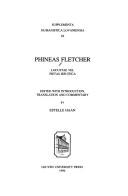| Listing 1 - 3 of 3 |
Sort by
|
Book
ISBN: 1787373584 9781787373587 Year: 2017 Publisher: London : Copyright Group,
Abstract | Keywords | Export | Availability | Bookmark
 Loading...
Loading...Choose an application
- Reference Manager
- EndNote
- RefWorks (Direct export to RefWorks)
English poetry. --- Human body. --- Fletcher, Phineas, 1582-1650.

ISBN: 9061867371 9789061867371 Year: 1996 Volume: 9 Publisher: Leuven: Leuven university press,
Abstract | Keywords | Export | Availability | Bookmark
 Loading...
Loading...Choose an application
- Reference Manager
- EndNote
- RefWorks (Direct export to RefWorks)
Neo-Latin literature --- History of the United Kingdom and Ireland --- Society of Jesus --- Buskruitverraad, 1605 in literatuur --- Complot des Poudres, 1605 en littérature --- Gunpowder Plot, 1605 in literature --- Gunpowder Plot, 1605 --- Epic poetry, Latin (Medieval and modern) --- Poésie épique latine médiévale et moderne --- Poetry. --- Translations into English. --- History and criticism. --- Traductions anglaises --- Great Britain --- Grande-Bretagne --- History --- Historiography --- Histoire --- Historiographie --- -Gunpowder Plot, 1605 --- -Epic poetry, Latin (Medieval and modern) --- -Academic collection --- 870.9004 --- Latin epic poetry, Medieval and modern --- Latin poetry, Medieval and modern --- Translations into English --- Poetry --- History and criticism --- Literature Latin 1350 --- -Great Britain --- -Historiography. --- Poésie épique latine médiévale et moderne --- Academic collection --- Historiography. --- Latin poetry [Medieval and modern ] --- Fletcher, Phineas --- Gunpowder Plot, 1605 - Poetry. --- Epic poetry, Latin (Medieval and modern) - Translations into English. --- Epic poetry, Latin (Medieval and modern) - History and criticism. --- Fletcher (phineas)

ISBN: 0691006946 9780691006949 0691222592 Year: 2000 Publisher: Princeton, N.J. : Princeton University Press,
Abstract | Keywords | Export | Availability | Bookmark
 Loading...
Loading...Choose an application
- Reference Manager
- EndNote
- RefWorks (Direct export to RefWorks)
This innovative work of historical sociology locates the origins of modern democratic discourse in the emergent culture of printing in early modern England. For David Zaret, the key to the rise of a democratic public sphere was the impact of this culture of printing on the secrecy and privilege that shrouded political decisions in seventeenth-century England. Zaret explores the unanticipated liberating effects of printing and printed communication in transforming the world of political secrecy into a culture of open discourse and eventually a politics of public opinion. Contrary to those who locate the origins of the public sphere in the philosophical tracts of the French Enlightenment, Zaret claims that it originated as a practical accomplishment, propelled by economic and technical aspects of printing--in particular heightened commercialism and increased capacity to produce texts. Zaret writes that this accomplishment gained impetus when competing elites--Royalists and Parliamentarians, Presbyterians and Independents--used printed material to reach the masses, whose leaders in turn invoked the authority of public opinion to lobby those elites. Zaret further shows how the earlier traditions of communication in England, from ballads and broadsides to inn and alehouse conversation, merged with the new culture of print to upset prevailing norms of secrecy and privilege. He points as well to the paradox for today's critics, who attribute the impoverishment of the public sphere to the very technological and economic forces that brought about the means of democratic discourse in the first place.
Opinion publique --- Démocratie --- Société civile --- Democracy --- Civil society --- Public opinion --- History --- Grande-Bretagne --- Great Britain --- Politique et gouvernement --- Politics and government --- Assembly of Divines. --- Bible or Bibles. --- Buckinghamshire. --- Burton, Robert. --- Calhoun, Craig. --- Canterbury (Kent). --- Catholics. --- Charles I. --- Chettle, Henry. --- Cornwall. --- Cromwell, Thomas. --- Dering, Edward. --- Dillingham, John. --- Edward IV. --- Erasmus, Desiderius. --- Exclusion Crisis. --- Filmer, Robert. --- Fletcher, Phineas. --- Giddens, Anthony. --- Grand Remonstrance. --- Hampden, John. --- Henry VIII. --- Herefordshire. --- Hundred Years War. --- James I. --- Jenison, Robert. --- Kent. --- Lancashire. --- Levellers. --- Lincolnshire. --- Locke, John. --- Marx, Karl. --- Oxford. --- Parliamentarians. --- Paston family. --- Presbyterians. --- alehouses. --- apprentices. --- assize sessions. --- ballads. --- book sellers. --- censorship. --- coffeehouses. --- corantos. --- deism. --- fast sermons. --- grievances. --- inns or taverns. --- journalists. --- justices of the peace. --- libels. --- natural religion. --- patronage. --- Démocratie --- Société civile
| Listing 1 - 3 of 3 |
Sort by
|

 Search
Search Feedback
Feedback About UniCat
About UniCat  Help
Help News
News